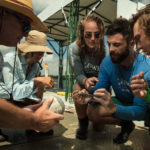Students get their hands dirty and feet wet
This summer, UWF students are digging and diving into the past by participating in maritime and terrestrial field schools. Offered by the Department of Anthropology, the field schools provide students with unique, hands-on opportunities to test their skills in archaeology through surveying, mapping and test excavations at various locations. Led by renowned archaeologists, the schools bring classroom instruction to life.
The Maritime Archaeology Field School, co-directed by UWF archaeologists John Bratten and Gregory Cook, offers qualified students the opportunity to participate in underwater excavations.
“One of the most exciting aspects of this year’s maritime field school is excavating the second shipwreck identified from the Tristan de Luna expedition of 1559,” said Bratten. “Students are eager to locate the stern and mast-step of the vessel, both of which contain valuable information that will further their understanding of 16th-century Spanish ship construction.”
When students are not diving, they perform topside duties such as dive tending and support, artifact recording and database entry. Fieldwork is supplemented by lectures and discussions on themes ranging from the colonization of Northwest Florida to maritime landscapes and economic maritime connections in the Gulf region.
“What is great about the maritime field school is that it is maritime archaeology in practice, and it goes beyond reading and studying,” said Jacob Shidner, a graduate anthropology student. “Hopefully, I can put what I learn here to use in a job either for the government or in the private sector conducting maritime archaeology.”
In addition to the maritime school, UWF is offering two terrestrial field schools this summer: Colonial Frontiers and Arcadia. The Pensacola Colonial Frontiers Survey Field School, led by archaeologist John Worth, centers on the search for outlying communities associated with Pensacola’s three Spanish presidios including Native American villages and farmsteads. The search will include one or more areas along the Escambia River valley and the shores of Pensacola Bay.
“Historical documents have narrowed our search for Pensacola’s lost Spanish missions, but now our students are conducting the archaeological fieldwork designed to locate them on the ground and learn more about this chapter of our local history,” said Worth.
The Arcadia Terrestrial Field School, led by John Phillips, focuses on the archaeology of ethnicity, social structure and community organization in the antebellum south. The Arcadia Mill complex, which operated between 1817 and 1855, was a thriving industrial village of mixed ethnicity, including many enslaved African-Americans, who built the facilities and labored in its mills.
The field schools are offered each summer term, running from June to early-August with students working steadily Monday through Friday. Undergraduate students also have the option to combine the maritime and terrestrial field schools. For more information about the Archaeology Field Schools at UWF, visit uwf.edu/anthropology/schools.
Written by Lauren Smith, University Marketing Communications


